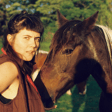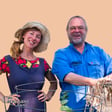
Oh, Miserable Modernity! with Yin Paradies
Dr. Yin Paradies is a loving tearer downerer of teetering assumptions, a recalibrator of compasses, an Aboriginal-Asian-Anglo Australian conducting deep research on racism, anti-racism, Indigenous knowledges and decolonisation.
Despite inhabiting a comfortable burrow in academia as the Chair of Race Relations at Deakin University, he’s also an anarchist, an animist, a trickster, a disruptor and a sage voice on so many topics that Reskillience is interested in. This is one of those convos that creeps up on you, that builds in energy and quietly blows shit apart.
We discuss the aliveness of everything, the possibility in passivity, the nature of prayer, the perils of intentional communities and how Yin and his kin at Anam Cara are doing things differently. We talk about karma yoga, eldering, sociocracy and little bits of carrot floating in the soup of consciousness. I loved my time with Yin, and welcome you intto this quietly radical conversation.
The Everything Seed ~ Carole Matignacco
In the Time of White Raven: Activism and Animism talk ~ March 3rd 2024
Carol Sandford – Indirect Work
NBLT – Nature Based Leadership Training
Spell of the Sensuous ~ David Abram



















